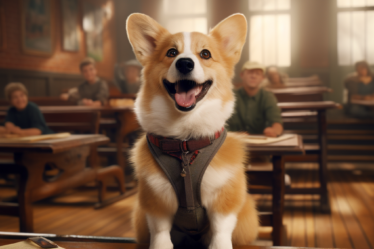
Congratulations on welcoming a fluffy, stubby-legged bundle of joy into your life! Bringing home a corgi puppy is an exciting adventure, but it also comes with the responsibility of puppy training. Those adorable nips and puddles will eventually turn into charming quirks (well, mostly), but it takes some dedication and know-how to get there with this occasionally stubborn – or should we say head-strong? – breed.
Fear not, fellow corgi enthusiasts! This guide will walk you through the essential training milestones for your corgi’s first year, ensuring a smooth transition from playful pup to well-behaved companion.
The First Few Weeks: Building a Foundation
The first few weeks are crucial for establishing routines and fostering trust. Here are some key things to focus on:
- Potty Training: Accidents happen, but consistency is key. Set up a designated potty area, take your pup out frequently (especially after meals and playtime), and reward them lavishly for success. Remember, patience is key!
- Crate Training: Your crate is your pup’s safe haven and a valuable training tool. Make it cozy with blankets and toys, and gradually introduce them to spending time inside with positive reinforcement.
- Socialization: Expose your pup to different people, animals, and environments in a controlled and positive way. This will help prevent future fear-based behaviors. Puppy playdates in safe spaces are a great way to socialize your corgi.
Essential Commands: Your Corgi’s Vocabulary
Communication is key to a happy relationship with your dog. Start with these basic commands and gradually expand your pup’s vocabulary:
- Sit: Lure your pup into a sitting position with a treat, then say “sit” as they lower their bottom. Reward immediately!
- Come: Make coming to you fun! Call your pup’s name in an excited voice and reward them with a treat or playtime when they approach.
- Stay: Hold your pup’s leash, say “stay,” and take a step back. If they stay, reward them. Gradually increase the distance and duration as they master the command.
- Leave it: Distract your pup from something they shouldn’t have with a treat or toy, then say “leave it” as you take the unwanted item. Reward them for letting go.
Puppyhood Playtime: Fun and Learning Combined
Playtime isn’t just for fun; it’s also a valuable training opportunity. Use interactive toys, engage in tug-of-war (with appropriate control), and practice basic commands during playtime. Remember, keep sessions short and positive to maintain your pup’s attention.
The Teenage Years: Testing Boundaries and Boundaries
Around 6-18 months, your corgi may enter a “teenage” phase, testing boundaries and pushing limits. Stay calm and consistent with your training methods. Don’t give in to whining or barking, and redirect unwanted behavior with positive reinforcement.
Remember:
- Positive reinforcement is key. Reward good behavior with treats, praise, or petting to encourage repetition.
- Be patient and consistent. Training takes time and repetition. Don’t get discouraged if your pup doesn’t get it right away.
- Seek professional help if needed. Don’t hesitate to consult a qualified dog trainer if you’re facing challenges.
Bonus Tip: Embrace the Corgi Crazies! Corgis are known for their silly antics and infectious enthusiasm. Enjoy the journey, laugh at the zoomies, and cherish the memories you’re creating with your furry best friend.
With dedication, patience, and plenty of love, you can guide your corgi puppy through their first year and lay the foundation for a lifetime of happiness and companionship. Remember, a well-trained corgi is a joy to be around, both for you and everyone they meet. So, grab your treats, put on your walking shoes, and get ready for an unforgettable adventure with your fluffy corgi companion!
If you have any tips of your own, please feel free to share them in the comments below. Happy training!
